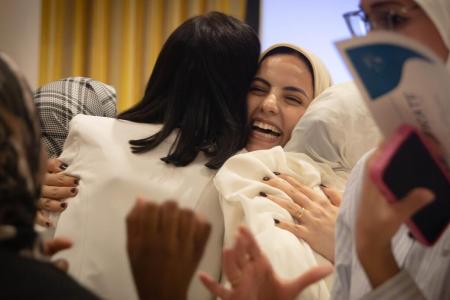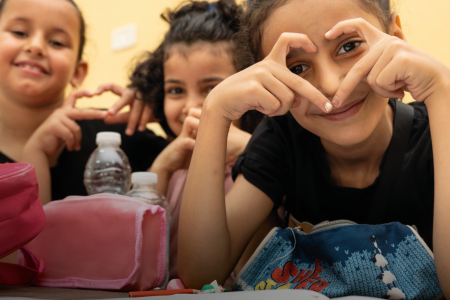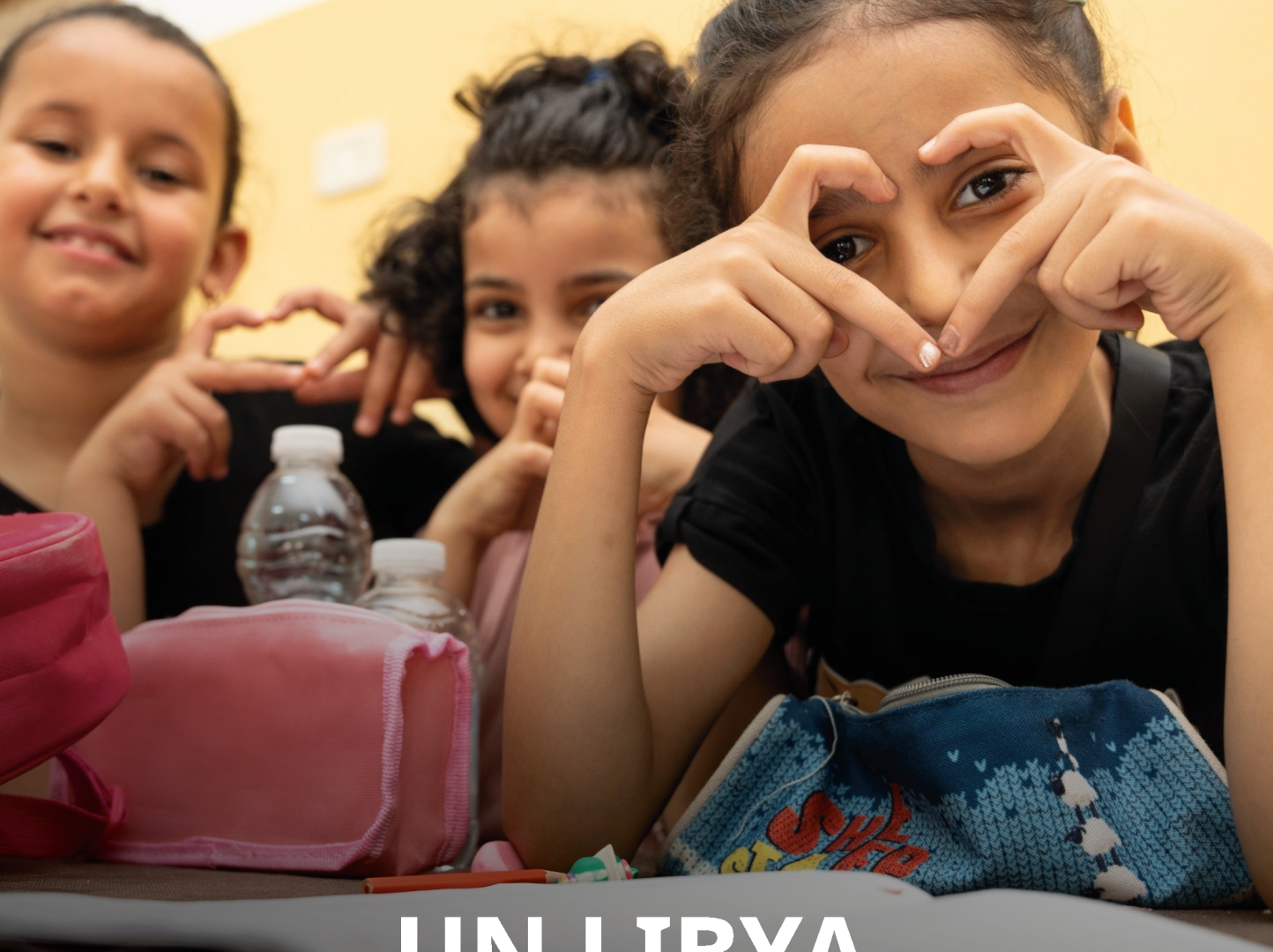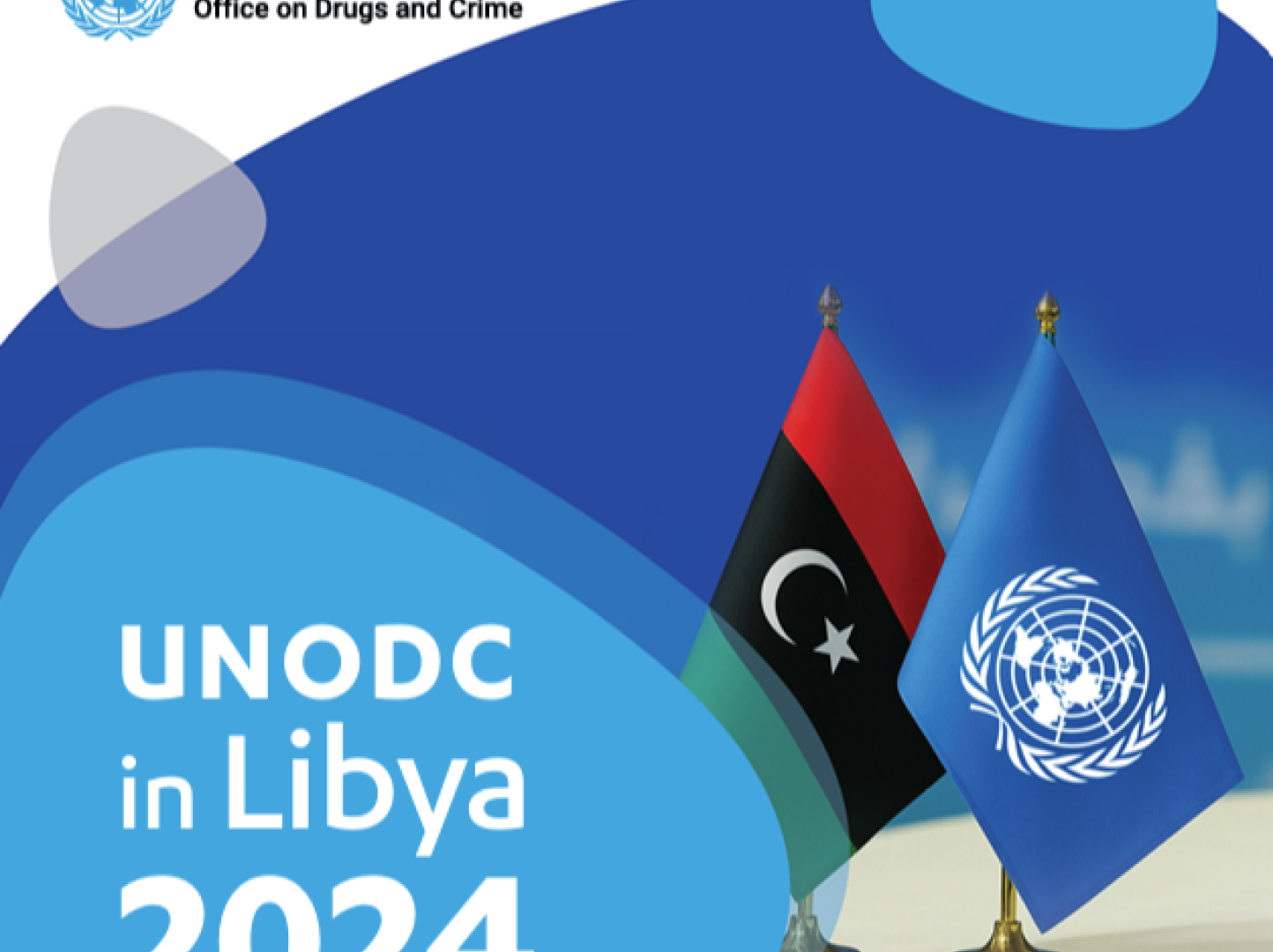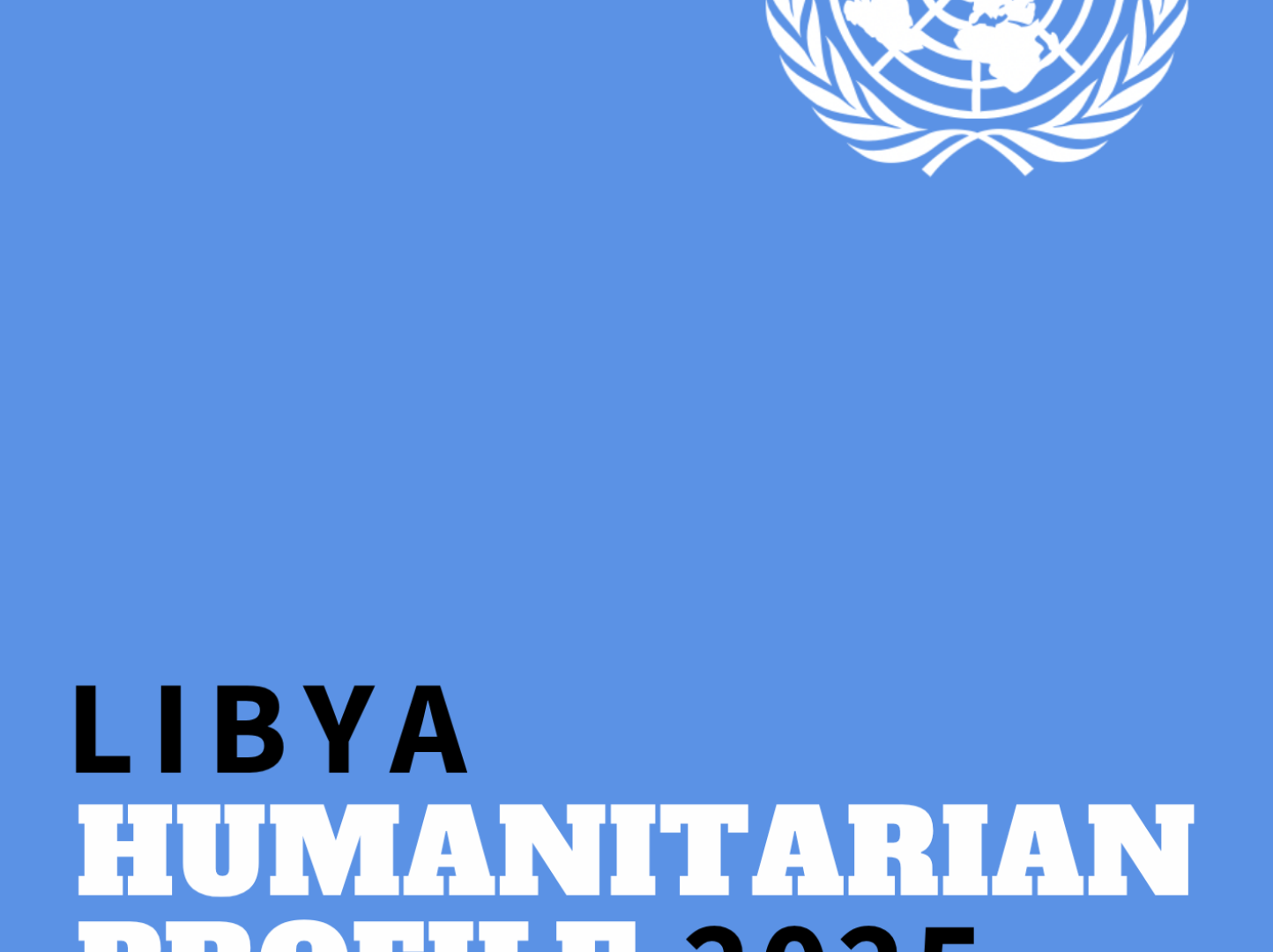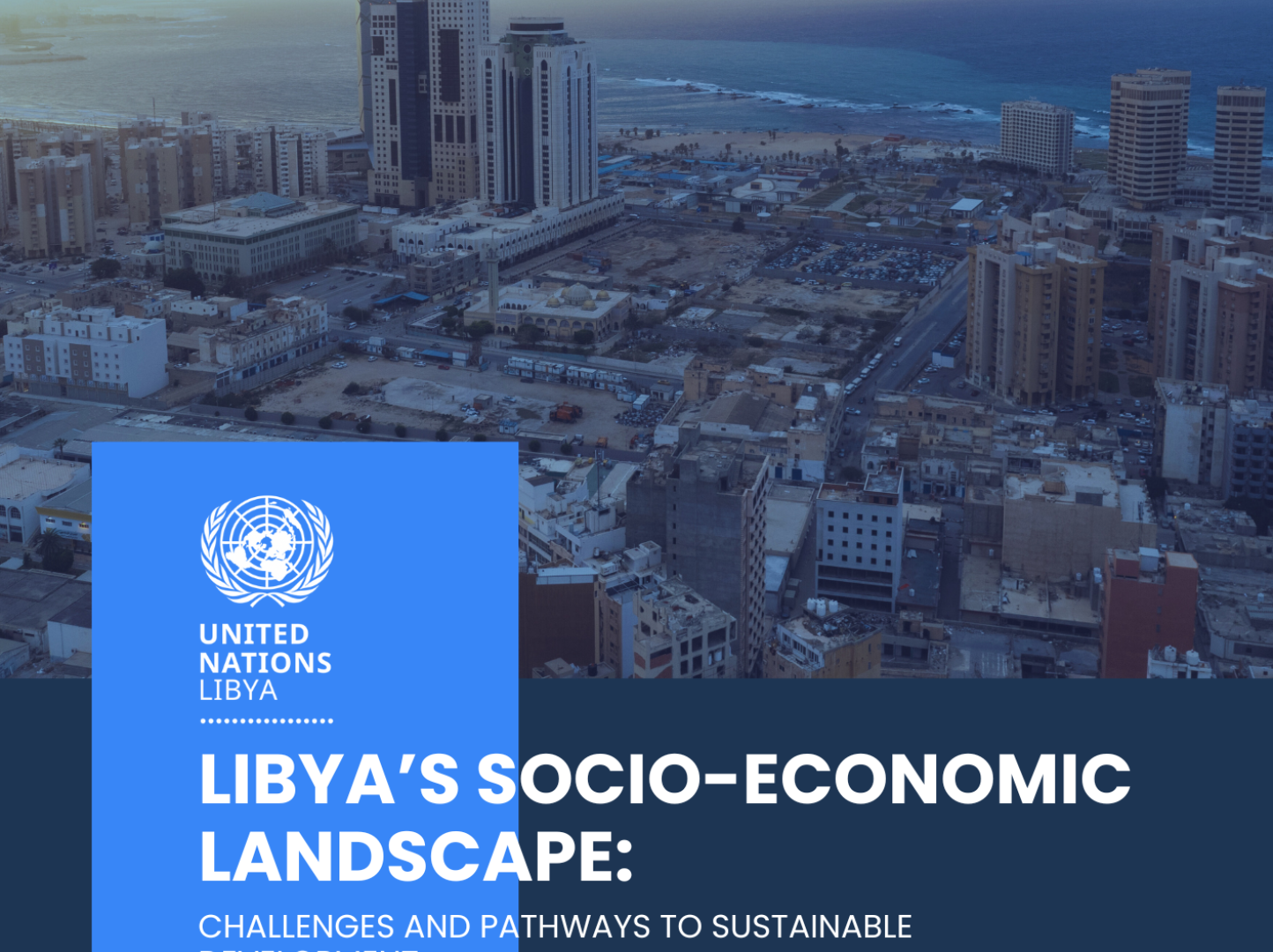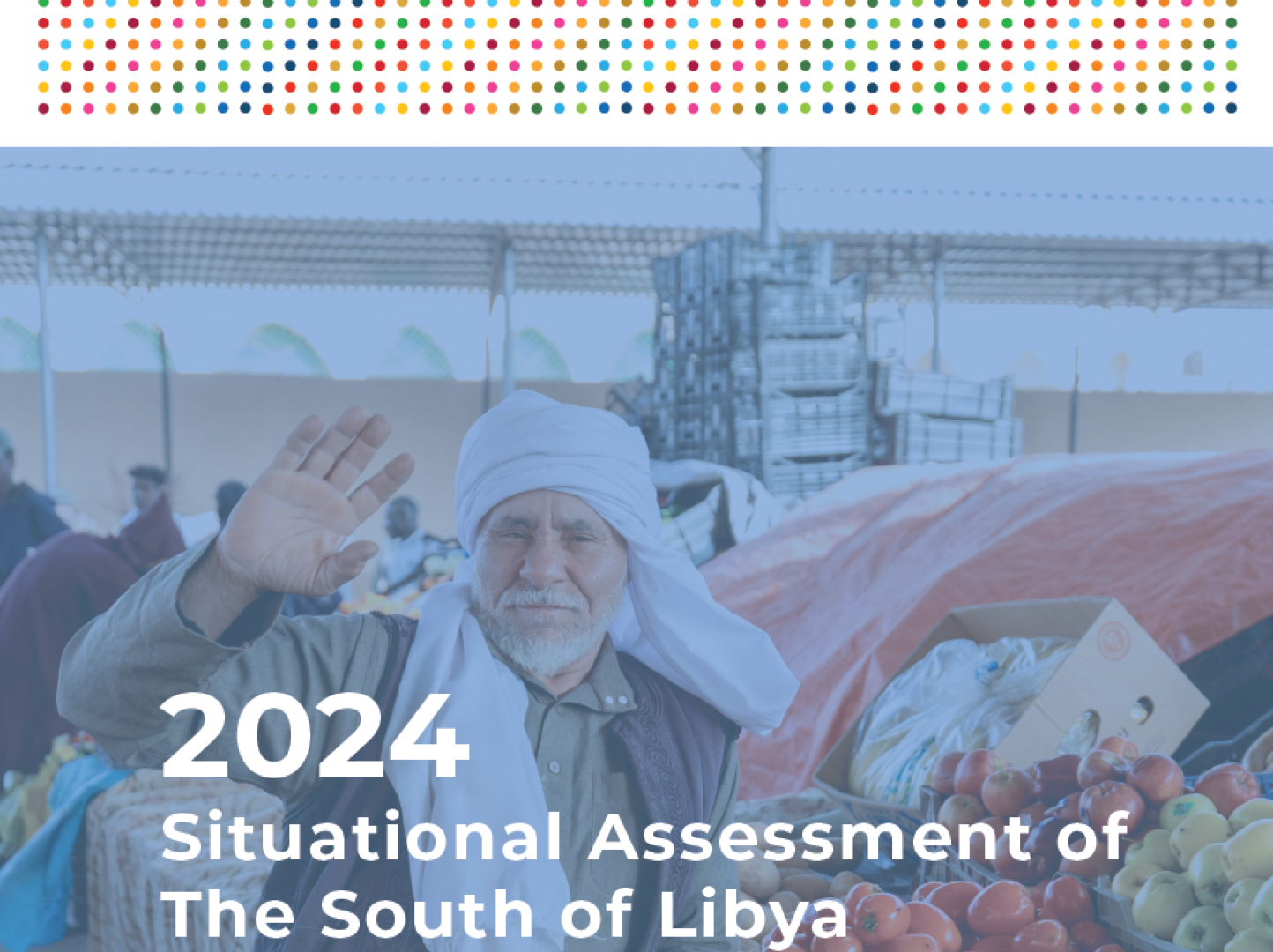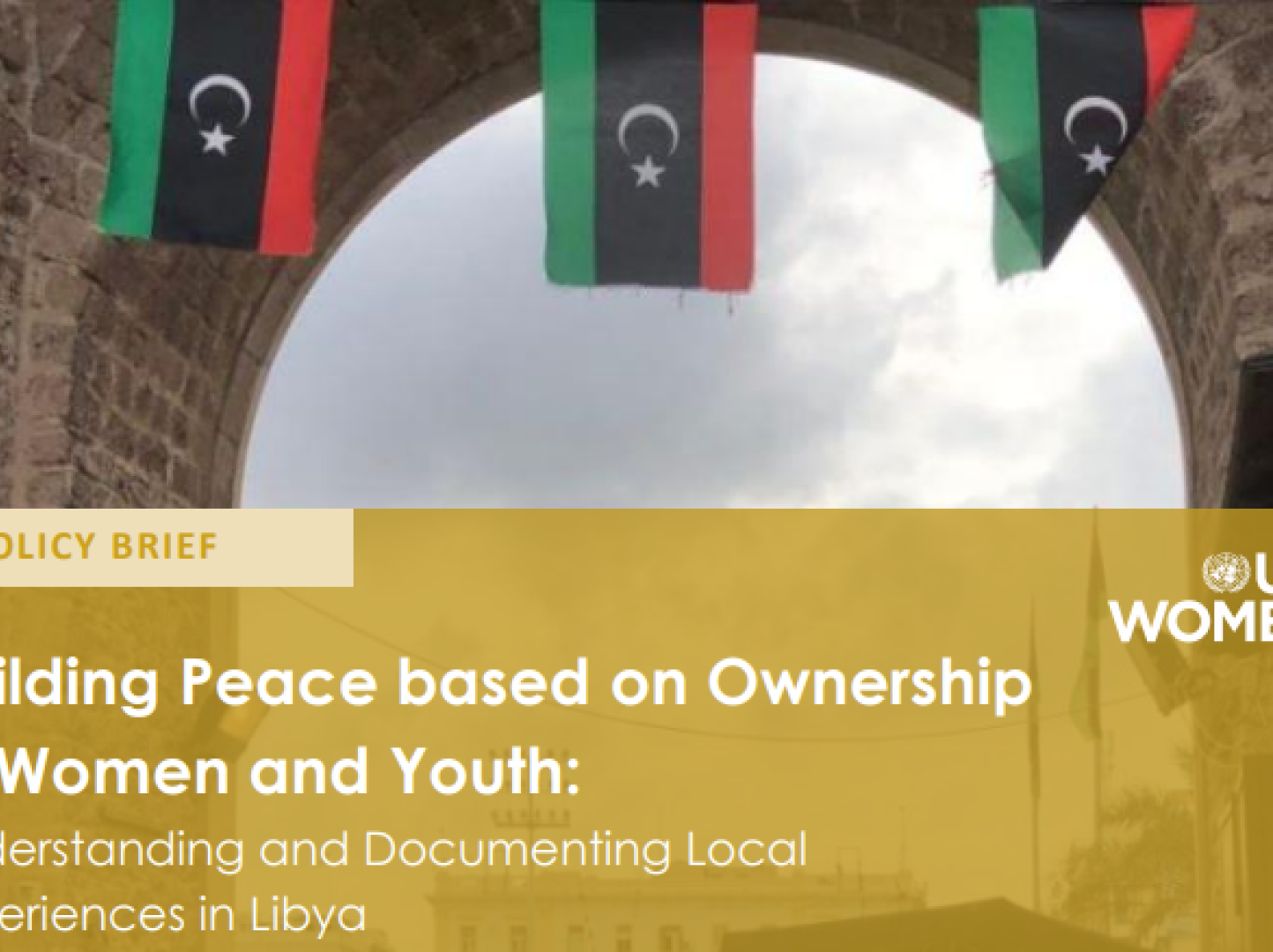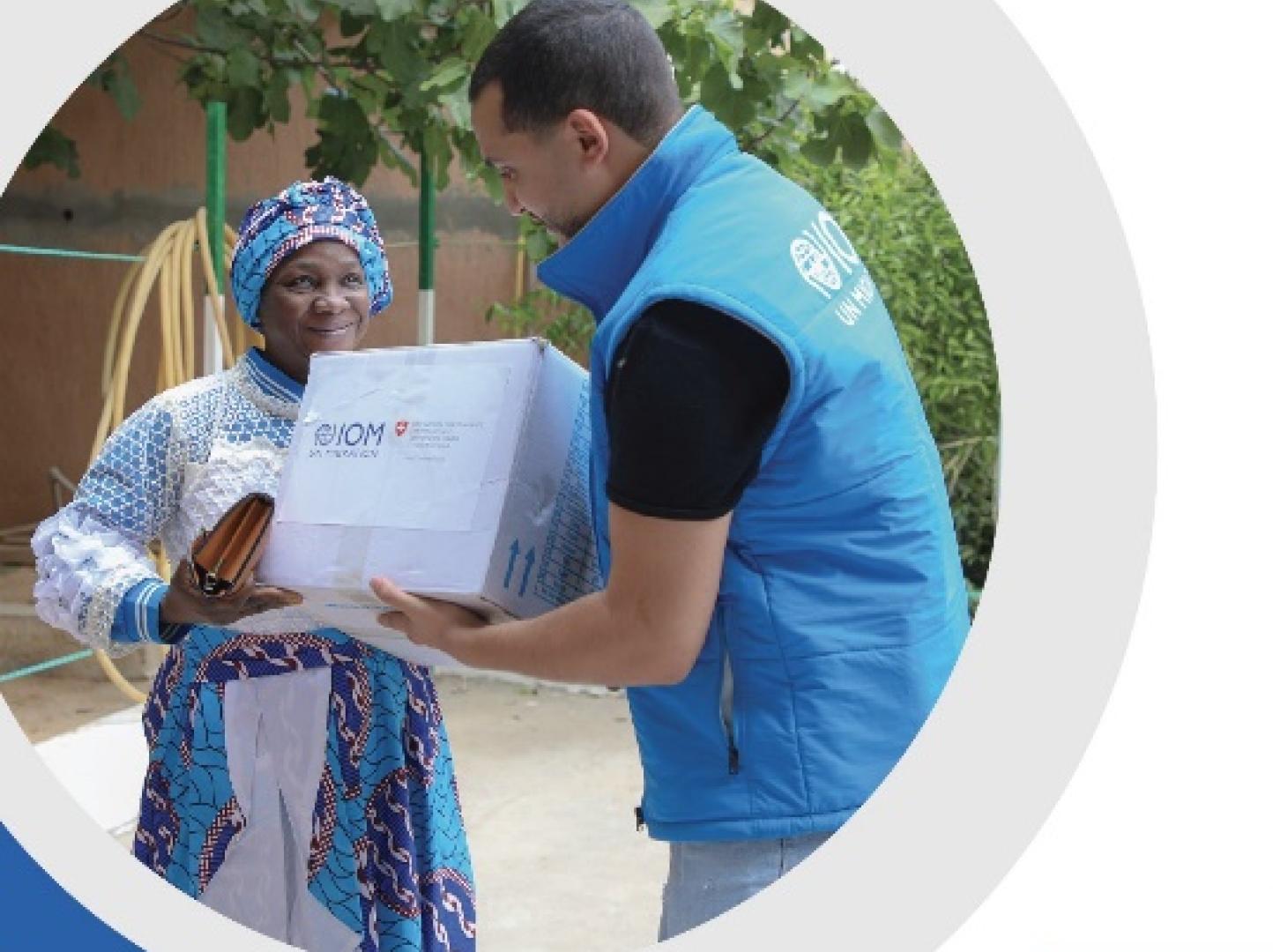Latest
Story
01 February 2026
15 Years of Struggle. Today, Water has Returned!
Learn more
Story
15 January 2026
EcoVision: Libya Youth Climate Challenge 2026 launches
Learn more
Press Release
12 January 2026
UNODC Releases the First Report on Drug Trafficking Dynamics in Libya and across North Africa
Learn more
Latest
The Sustainable Development Goals in Libya
The Sustainable Development Goals are a global call to action to end poverty, protect the earth’s environment and climate, and ensure that people everywhere can enjoy peace and prosperity. These are the goals the UN is working on in Libya:
Press Release
10 August 2025
Secretary-General appoints Ms. Ingeborg Ulrika Ulfsdotter Richardson of Sweden as Deputy Special Representative of the Secretary-General in the United Nations Support Mission in Libya and Resident Coordinator in Libya
She has over 30 years of experience in development and humanitarian assistance and post-conflict recovery, with a focus on complex political, socio-economic, and human rights contexts. She has spent most of her career with the United Nations, serving in various regions, including West and Central Africa, the Caribbean, the Western Balkans and South-East Europe. Ms. Richardson has been the Deputy Special Representative for the United Nations Integrated Office in Haiti (BINUH), Resident and Humanitarian Coordinator in Haiti since 2022, and was previously the Resident Coordinator in Kosovo, working closely with United Nations Interim Administration Mission in Kosovo (UNMIK) (2018-2022). Her earlier assignments include serving as the United Nations Resident Coordinator and Resident Representative of the United Nations Development Programme (UNDP), United Nations Children’s Fund and United Nations Population Fund in Cabo Verde (2013-2018), UNDP Resident Representative in Gabon (2012-2013), and Deputy Resident Representative in Türkiye (2007-2012) and in Cuba (2004-2007).Ms. Richardson holds a master’s degree in development economics from Gothenburg University and a Bachelor of Social Science from Lund University, both in Sweden. In addition to her native Swedish, she is fluent in English, French, Portuguese, and Spanish.New York, 8 August 2025
1 of 5
Publication
25 June 2025
UN Libya Annual Results Report 2024
In 2024, the UN in Libya continued to support Libya’s development priorities through more than 250 projects and initiatives under the United Nations Sustainable Development Cooperation Framework (2023–2026), focusing on:Peace and GovernanceSustainable Economic DevelopmentSocial and Human Capital DevelopmentClimate Change, Environment, and WaterDurable Solutions for Internally Displaced Persons (IDPs)Migration ManagementFrom supporting municipal elections to helping launch Libya’s first National Sustainable Energy Strategy—and from enhancing access to services for IDPs and host communities to expanding opportunities for youth and women—2024 marked meaningful progress across the country.In 2025, the UN in Libya will continue to work with national and local partners to advance inclusive and sustainable development, strengthen service delivery, and respond to emerging needs—with a focus on climate resilience and youth empowerment.
1 of 5
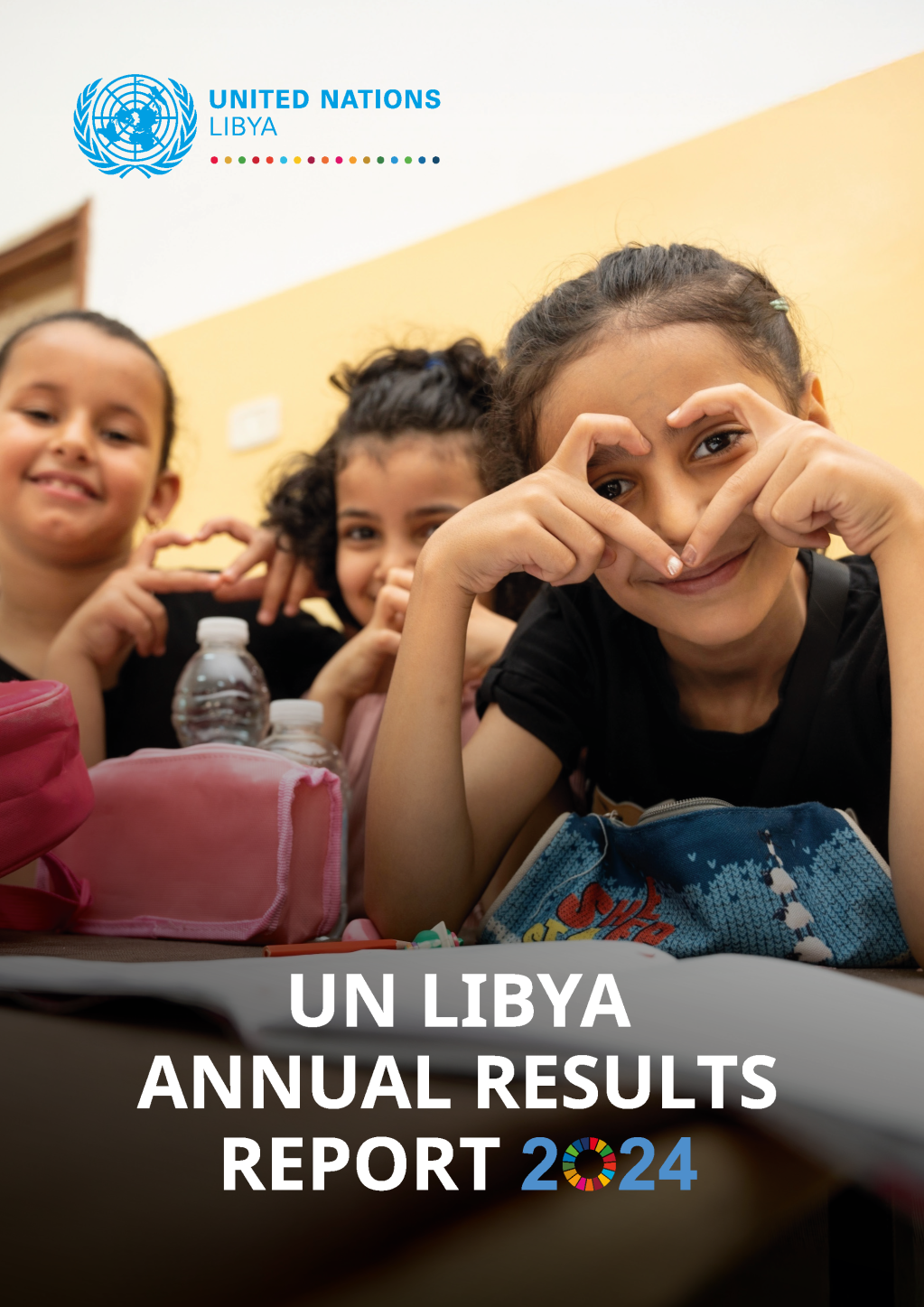
Story
19 August 2025
Her Voice, Their Hope: Celebrating Women Humanitarians on World Humanitarian Day
Hayat, 23, volunteers with the Libyan Red Crescent in Bani Waleed. When she first joined, her choice was not always welcomed. Some in her community told her, “You’re a girl, stay home.” But Hayat kept showing up. With her family’s support—especially her father’s—she stayed committed, knowing she had something meaningful to give.For Hayat, volunteering was never just a hobby. It was a responsibility. “Giving isn’t extra,” she said. “It’s something we owe each other.”As she began her work, she noticed how often women were excluded or left without support. Families didn’t always know where to turn. Hayat decided to step in, to be what she calls a “bridge” between those in need and those who could help.One of her first roles was at a local pharmacy. Many women felt uncomfortable speaking to male pharmacists about private health issues. Hayat stood beside them, helping them explain their needs. “Just standing with them gave them confidence,” she recalled. Her presence was often enough to make women feel supported.On another occasion, she visited children in the kidney ward, bringing handmade cards to lift their spirits. A young girl looked at her and said, “We want to be like you.” That moment stayed with Hayat—it reminded her why her work mattered.The path was not always easy. Some doubted her, but she chose to focus on the people she could help. “I didn’t do this for approval,” she explained. “I did it because someone needed me.”Over time, her persistence paid off. Hayat became a team leader, training new volunteers and encouraging them to grow. For her, leadership was about listening, guiding, and making space for others’ ideas.In December 2024, she took part in a Training of Trainers (ToT) program led by UN Women, the Ministry of Local Governance, and the Libyan Red Crescent. The training on women’s needs in humanitarian crises gave her practical tools she now applies in every visit and every conversation.On this #WorldHumanitarianDay, Hayat stands as an example of the countless young women who embody the true spirit of humanitarian action. She speaks with calm, steady purpose, listens without judgment, and helps women feel seen and heard—never seeking recognition for herself, but always working for others.Looking back, she says her work gave her more than she expected. “Humanitarian work shaped me,” she reflected. “It gave me a voice and a place in my country.”Her story reminds us of the power of women’s leadership in humanitarian response. This World Humanitarian Day, we celebrate Hayat—and all those who, step by step, are changing their communities and building hope.
1 of 5

Press Release
25 November 2024
United Nations in Libya calls for action to protect and promote the rights of women
The 16 Days of Activism against Violence against women and girls is an annual international campaign, which commences on 25 November, the International Day for the Elimination of Violence against Women, and ends on 10 December. Under the leadership of the United Nations Secretary-General, António Guterres, UNiTE by 2030 to End Violence against Women initiative (UNiTE) calls for global action to increase awareness, galvanize advocacy efforts and share knowledge and innovations to end VAWG once and for all.The United Nations in Libya reaffirms unwavering support to Libyans in ending all forms of violence, including against women and girls. We call on national and local authorities to urgently address any form of violence against women and girls and to advance the protection of women’s rights and their empowerment in line with their international obligations.Reports of troubling increase in online violence, including harassment, threats and sexual blackmail, particularly against activists and public figures, further underscore the need for stronger protection of women's rights including in the digital space. The United Nations in Libya remains committed to a comprehensive approach, including prevention, protection, survivor support and accountability, to ending violence against women and girls in Libya. In this context, we acknowledge the critical role of women’s empowerment in preventing violence against women. As we commence the 16 Days of Activism, the United Nations in Libya would like to recognize the progress achieved through collaboration between the state and United Nations entities in protecting and empowering women and girls. We will continue working with the government, local partners and civil society to ensure that every woman and girl in Libya can enjoy her full rights and live free from fear of violence.
1 of 5
Publication
12 August 2024
Building Peace based on Ownership of Women and Youth: Understanding and Documenting Local Experiences in Libya
The prolonged conflict in Libya has significantly hindered the progress of women and youth in peacebuilding efforts, leaving the Women, Peace, and Security (WPS) and Youth, Peace, and Security (YPS) agendas marginalized and facing considerable challenges. Despite constitutional provisions and quotas aimed at increasing women's representation in parliament and leadership positions, there are no guarantees to protect them from retaliatory actions due to the lack of security sector reforms. Moreover, the role of youth in peacebuilding is underappreciated, with many studies highlighting a significant lack of gender- and age-disaggregated data on the conflict and violence in Libya, which presents an incomplete picture of the challenges faced by Libyan women and youth. In response, UN Women Libya, in collaboration with the Global Partnership for the Prevention of Armed Conflict (GPPAC), conducted a survey to better understand and document the experiences of local peacebuilders. This paper captures the perspectives and challenges of Libyan women and youth in peacebuilding, offering insights and recommendations to enhance their inclusion and leadership in the process.
1 of 5
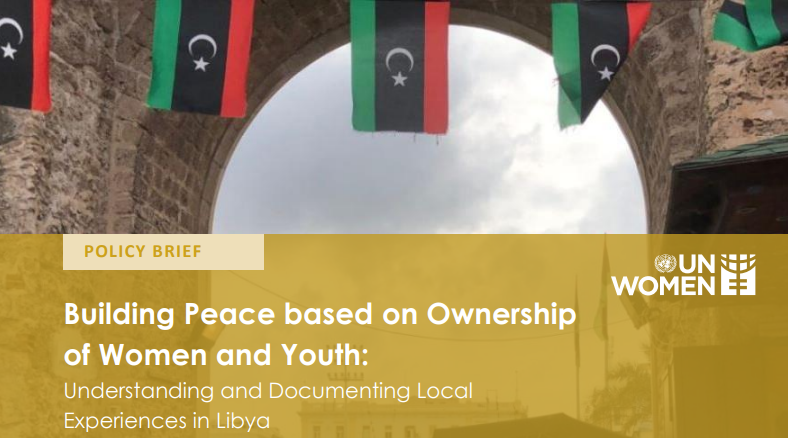
Story
01 February 2026
15 Years of Struggle. Today, Water has Returned!
A Daily Struggle for WaterUm Alruzm, Libya, 20 December 2025. For more than 15 years, families in Um Alruzm, a flood-affected city near Derna in Eastern Libya, lived with constant worry - where their next drink of water would come from. The limited water available was saline and unsafe for drinking, forcing families to rely on unhealthy sources for their daily needs. The lack of clean, safe water was not only a challenge, but it was also part of daily life. UNICEFLIBYA/2025/Ibraheem 15 Years of Patience and Suffering“Imagine starting your day at five in the morning, filling water containers from a distant well, waiting your turn at a public water station, or paying big amounts to buy water from private tankers. We suffered for more than 15 years from a shortage of safe drinking water, with no reliable source. We had to travel long distances and could never be sure the water was clean or disinfected. It cost us time, effort, and money, and left us in constant worry about our children’s health. Life revolved around one daily question: where will we get water today?” Ali Omrajah Mohammed, Um Alruzm resident. UNICEFLIBYA/2025/Ibraheem The Turning Point: Hope Knocks on the DoorIn June 2025, a new chapter began in the life of Um Alruzm. With support from Kuwait and the Sheikh Abdullah Al-Nouri Charity, a water desalination plant was installed by UNICEF. Once it became operational, clean water began to flow, transforming the lives of residents. “When the plant started operating, we felt a big difference. We no longer had to travel long distances or worry about the quality of the water.” UNICEFLIBYA/2025/Ibraheem "We now have a reliable source available 24 hours a day. This gave us a sense of safety that we hadn’t experienced for years." Saeed Mohammed Khalifa, Head of Um Alruzm Services Center. UNICEFLIBYA/2025/Ibraheem"Now the water is here, and it is good. The children were the most affected," said Abdulmalik Ali Marajea, a 10-year-old boy.
"Now the water is disinfected and safe. Everything is much better." UNICEFLIBYA/2025/Ibraheem Every drop of water has restored a sense of normalcy to childhood and has brought peace of mind to the families. Today, with reliable access to water, the community looks to the future with renewed confidence. Water has returned… and with it, life.
"Now the water is disinfected and safe. Everything is much better." UNICEFLIBYA/2025/Ibraheem Every drop of water has restored a sense of normalcy to childhood and has brought peace of mind to the families. Today, with reliable access to water, the community looks to the future with renewed confidence. Water has returned… and with it, life.
1 of 5

Story
15 January 2026
EcoVision: Libya Youth Climate Challenge 2026 launches
BENGHAZI – Benghazi marked the first stop in a nationwide series of EcoVision events across Sebha and Tripoli, with the launch of the EcoVision: Libya Youth Climate Challenge 2026 through a two-day inaugural event bringing together youth innovators from across eastern Libya.Developed by the United Nations in Libya and implemented with the support of Innovative Garden, EcoVision is a national initiative designed to empower young people and support practical, market-ready solutions to pressing climate and environmental challenges. The initiative contributes to the United Nations’ cooperation priorities in Libya by investing in youth skills, innovation, and inclusive economic opportunities linked to climate resilience and sustainable development.The two-day Benghazi edition convened young innovators alongside representatives from United Nations agencies, national institutions, and the private sector.Youth teams shortlisted from more than 300 applications participated in intensive capacity-building sessions focused on climate-oriented business development, financial planning, impact measurement, and pitching skills, before presenting their proposals to a multi-sectoral jury.At the conclusion of the event, four initiatives were awarded seed funding, alongside continued mentorship, supporting their transition from concept development to business launch and scale-up.One participant noted, “This initiative gave us the chance to refine our ideas, gain valuable experience, and turn them into sustainable business solutions.” A winning team added, “EcoVision created real opportunities to make a positive impact on our environment and inspired us to drive change.”Teams not awarded seed funding will be connected with relevant United Nations entities to help explore potential funding opportunities and continued mentorship support.Following Benghazi, the EcoVision Youth Climate Challenge 2026 will continue in Sebha and Tripoli, reinforcing a nationwide effort to position young people as key drivers of climate resilience, innovation, and sustainable development in Libya.
1 of 5

Story
05 January 2026
For 75 Years, Protection Has Saved Lives. Today, It Saved Hinwa’s
At 36, Hinwa Ahmed never imagined she would one day be forced to flee her home, seeking protection. For years, she had a stable life, a career, and a family in Darfur. Then the war came.War shattered everything
When conflict escalated in Darfur, armed groups began targeting civilians, spreading fear and violence across her community. People were accused, hunted, and punished based on suspicion alone.In July 2023, Hinwa’s family home was attacked. Her father and brother were killed.“They were looking for me,” she recalls. “They accused people of being spies. Anyone they suspected was at risk.”Hinwa fled overnight with her youngest son in her arms. In the chaos, she was separated from her husband and three older children—aged 13, 8, and 6.A desperate journey in search of safety
After escaping to Chad and finding no news, Hinwa continued her journey to Libya, hoping to find safety and assistance. Like many who are exhausted, grieving, and desperate, she also attempted the sea crossing. She tried several times. Each attempt ended in detention, and abuse. “I was detained for months. I had no family left to help me. I lost almost everything.” Even after release, life in Libya remained unsafe. She faced exploitation, homelessness, and violence. “There came a time when I was completely losing hope.”A lifeline: protection and care
“There came a time when I was completely losing hope,” she recalls. Eventually, she received medical care and support that helped her begin to heal—physically and emotionally—after everything she had endured. “And I thank UNHCR as well, because a solution was found for myself and my son.” Her journey to this point has been long, painful, and marked by unimaginable loss. But it is also a testament to resilience and to the importance of durable solutions for those who have acute protection needs.A pathway to safety
Through the humanitarian corridors from Libya to Italy, Hinwa and her son have finally been offered a chance to rebuild their lives in safety. “I lost my home, my family, my work… everything,” she says. “But now at last my boy can have a good life.” These safe and legal pathways are lifesaving for survivors of conflict, violence, and persecution. For Hinwa, the humanitarian corridor is the beginning of a future where her son can grow without fear.75 years of protection
As UNHCR marks 75 years of protecting people forced to flee, stories like Hinwa’s remind us why this mandate matters and why durable solutions remain essential. Humanitarian corridors offer a real alternative to dangerous journeys. They save lives. They give families a chance to heal. And they uphold the core principles that have guided UNHCR for seven decades: protection, dignity, and hope. “I had a good life once,” she says. “In one moment, everything disappeared. But now… now there is hope again.”
When conflict escalated in Darfur, armed groups began targeting civilians, spreading fear and violence across her community. People were accused, hunted, and punished based on suspicion alone.In July 2023, Hinwa’s family home was attacked. Her father and brother were killed.“They were looking for me,” she recalls. “They accused people of being spies. Anyone they suspected was at risk.”Hinwa fled overnight with her youngest son in her arms. In the chaos, she was separated from her husband and three older children—aged 13, 8, and 6.A desperate journey in search of safety
After escaping to Chad and finding no news, Hinwa continued her journey to Libya, hoping to find safety and assistance. Like many who are exhausted, grieving, and desperate, she also attempted the sea crossing. She tried several times. Each attempt ended in detention, and abuse. “I was detained for months. I had no family left to help me. I lost almost everything.” Even after release, life in Libya remained unsafe. She faced exploitation, homelessness, and violence. “There came a time when I was completely losing hope.”A lifeline: protection and care
“There came a time when I was completely losing hope,” she recalls. Eventually, she received medical care and support that helped her begin to heal—physically and emotionally—after everything she had endured. “And I thank UNHCR as well, because a solution was found for myself and my son.” Her journey to this point has been long, painful, and marked by unimaginable loss. But it is also a testament to resilience and to the importance of durable solutions for those who have acute protection needs.A pathway to safety
Through the humanitarian corridors from Libya to Italy, Hinwa and her son have finally been offered a chance to rebuild their lives in safety. “I lost my home, my family, my work… everything,” she says. “But now at last my boy can have a good life.” These safe and legal pathways are lifesaving for survivors of conflict, violence, and persecution. For Hinwa, the humanitarian corridor is the beginning of a future where her son can grow without fear.75 years of protection
As UNHCR marks 75 years of protecting people forced to flee, stories like Hinwa’s remind us why this mandate matters and why durable solutions remain essential. Humanitarian corridors offer a real alternative to dangerous journeys. They save lives. They give families a chance to heal. And they uphold the core principles that have guided UNHCR for seven decades: protection, dignity, and hope. “I had a good life once,” she says. “In one moment, everything disappeared. But now… now there is hope again.”
1 of 5

Story
29 December 2025
Libyan youth engage on UN Youth, Peace and Security agenda in Amman
Libyan youth are helping shape the next decade of the Youth Peace and Security agenda in the Middle East and North Africa, bringing national priorities into a regional effort to move youth participation from policy commitments to tangible action on the ground in Libya.Three Libyan youth-led civil society organisations, alongside the Office of the Deputy Special Representative of the Secretary-General/Resident Coordinator of the United Nations Support Mission in Libya and the United Nations Population Fund (UNFPA) Libya, participated in the regional Youth Peace and Security workshop in Amman, Jordan, in December, which convened more than 70 young peacebuilders from across the region.The event marked ten years since the adoption of UN Security Council Resolution 2250 (2015), which established the Youth Peace and Security agenda in response to evidence that young people were disproportionately affected by conflict but largely excluded from decision-making.The workshop focused on reviewing progress, identifying persistent gaps, and setting priorities for the decade ahead, with a strong emphasis on translating regional learning into national strategies. Central to the discussions was the fundamental need to ensure that youth voices are not only present, but genuinely included, listened to and acted upon through structured and sustained dialogue with institutions and decision-makers.“This was an important opportunity to assess the YPS agenda from its inception to today,” said Alia Gargoum, a Libyan civil activist. “While there have been clear positive steps over the past ten years, there is still a significant gap between policy and implementation.”Participants highlighted regional challenges, including limited institutionalised youth engagement, uneven implementation of Youth, Peace and Security commitments, and the need for stronger coordination among governments, civil society and international partners. For young Libyan men and women, discussions also underscored how political and institutional fragmentation continues to constrain opportunities for meaningful engagement, making it difficult to translate youth initiatives into nationally anchored processes.Another theme was the urgent need for safe and inclusive spaces for youth participation at all levels, particularly at the local level, where young people are most directly affected by conflict, service gaps and governance challenges. Many participants noted that fear of intimidation or harassment, both in person and online, continues to discourage youth engagement. This challenge is particularly acute for young women, though it affects young people across the board.“One of the key takeaways for me is that peace and security must be approached regionally, not just locally,” said Alhassan Bakkar, Director of Programme Management at the Permanent Peace Foundation in Libya. “Listening to youth from different countries showed how interconnected our challenges are, and how much we can learn from each other’s solutions.”Participants reflected on the centrality of young people’s mental health and psychosocial wellbeing as a foundation for peace, resilience, and civic engagement. They emphasized that without addressing the cumulative impacts of conflict, displacement, climate shocks, and economic uncertainty, youth participation risks remaining symbolic rather than transformative.Discussions also reinforced the urgency of advancing government-led processes to implement the Youth, Peace and Security agenda and broader youth strategies that respond directly to the priorities and aspirations of Libyan young people.The workshop concluded with participants identifying concrete next steps, including strengthening national Youth, Peace and Security coordination mechanisms, expanding youth-led peace initiatives, and building cross-border partnerships.“As the Youth, Peace and Security agenda enters its second decade, Libyan youth are making it clear that they are not only beneficiaries of peace processes, but leaders shaping their country’s future. Sustained recognition, investment, and partnership will be essential to turn commitments into impact on the ground,” said Deputy Special Representative of the Secretary-General and Resident Coordinator Ulrika Richardson. “Regional platforms such as the Amman workshop ensure that young Libyans return home equipped with ideas, networks and momentum, strengthening local initiatives and contributing to long-term peace.”
Young men and women from across the Middle East and North Africa pose for a photo at a workshop on the Youth, Peace and Security agenda in December 2025. UN Youth Office
Young men and women from across the Middle East and North Africa pose for a photo at a workshop on the Youth, Peace and Security agenda in December 2025. UN Youth Office
1 of 5
Story
24 December 2025
When the Possibility of Return Becomes Real
At the airport's departure hall, emotions were mixed with quiet anticipation. For two Syrian families who have spent years in Libya, this day marked the end of a long chapter of displacement — and the beginning of a return they once thought might never come.“We Left Under the Bombs”For Seham, 35, the memories of leaving Syria in 2012 are still vivid.
“We fled under shelling, destruction, kidnapping, and fear,” she recalled. “We escaped just to survive.”Seham arrived in Libya with her husband, Mohamed Ziyad, and their young family. Over the years, the family grew to seven — five children, three of whom were born in Libya. Life was never easy. Without residency permits, enrolling the children in school became increasingly difficult.Where Memory and Family MeetFor Mohamed Ziyad, the thought of Damascus brings back vivid memories.
“The first place any Damascene thinks of is the Umayyad Mosque,” he said. “Then the old markets, the narrow streets of the Old City — these places are part of who we are.”Over the years, he showed his children photos of Damascus on his phone, describing its streets and stories so they would know the city long before ever seeing it.Seham’s return is also a long-awaited reunion. One of her sisters remains in Syria — a separation stretched over years by war, borders, and uncertainty.
“I haven’t seen her in so long,” Seham said. “Just the thought of being able to sit together again feels unreal.” A Journey That Began at 17 Standing nearby was Nour Eddine, 29, Ziyad’s cousin, who arrived in Libya when he was just 17.
“I didn’t leave by choice,” he said. “My family forced me to leave because it was too dangerous to stay”Nour came alone at first, later marrying and raising three children in Libya.Displacement took a heavy personal toll. Nour lost both his parents while away from Syria, never having the chance to say goodbye. They suffered complications after being exposed to chemical attacks in Eastern Ghouta in Syria.“My dream was just to see my mother,” he said. “She came to Libya only to arrange my marriage — and passed away three months later.Returning to Syria was impossible financially.
“For a family of five, the cost was a dream beyond reach,” he said. “This opportunity changed everything.”When asked what he looks forward to most, Nour didn’t hesitate:
“I want to visit my father’s grave. Then I want to walk through Damascus — the Old City and the streets of my childhood.”Hope, Carried Forward As their children waited nearby — some excited, some shy, some born far from the land their parents still call home — both families spoke of hope more than fear.“Fifteen years are a lifetime,” Mohamed Ziyad said. “But returning is something we have been waiting for every single day.”In 2025, UNHCR has organized four voluntary return flights to Syria, enabling more than 400 people to return home with dignity and support. UNHCR will organize similar flights in 2026, fulfilling the dream of many Syrians of going back to a place that never left them, a place called HOME.
“We fled under shelling, destruction, kidnapping, and fear,” she recalled. “We escaped just to survive.”Seham arrived in Libya with her husband, Mohamed Ziyad, and their young family. Over the years, the family grew to seven — five children, three of whom were born in Libya. Life was never easy. Without residency permits, enrolling the children in school became increasingly difficult.Where Memory and Family MeetFor Mohamed Ziyad, the thought of Damascus brings back vivid memories.
“The first place any Damascene thinks of is the Umayyad Mosque,” he said. “Then the old markets, the narrow streets of the Old City — these places are part of who we are.”Over the years, he showed his children photos of Damascus on his phone, describing its streets and stories so they would know the city long before ever seeing it.Seham’s return is also a long-awaited reunion. One of her sisters remains in Syria — a separation stretched over years by war, borders, and uncertainty.
“I haven’t seen her in so long,” Seham said. “Just the thought of being able to sit together again feels unreal.” A Journey That Began at 17 Standing nearby was Nour Eddine, 29, Ziyad’s cousin, who arrived in Libya when he was just 17.
“I didn’t leave by choice,” he said. “My family forced me to leave because it was too dangerous to stay”Nour came alone at first, later marrying and raising three children in Libya.Displacement took a heavy personal toll. Nour lost both his parents while away from Syria, never having the chance to say goodbye. They suffered complications after being exposed to chemical attacks in Eastern Ghouta in Syria.“My dream was just to see my mother,” he said. “She came to Libya only to arrange my marriage — and passed away three months later.Returning to Syria was impossible financially.
“For a family of five, the cost was a dream beyond reach,” he said. “This opportunity changed everything.”When asked what he looks forward to most, Nour didn’t hesitate:
“I want to visit my father’s grave. Then I want to walk through Damascus — the Old City and the streets of my childhood.”Hope, Carried Forward As their children waited nearby — some excited, some shy, some born far from the land their parents still call home — both families spoke of hope more than fear.“Fifteen years are a lifetime,” Mohamed Ziyad said. “But returning is something we have been waiting for every single day.”In 2025, UNHCR has organized four voluntary return flights to Syria, enabling more than 400 people to return home with dignity and support. UNHCR will organize similar flights in 2026, fulfilling the dream of many Syrians of going back to a place that never left them, a place called HOME.
1 of 5

Press Release
12 January 2026
UNODC Releases the First Report on Drug Trafficking Dynamics in Libya and across North Africa
The United Nations Office on Drugs and Crime (UNODC) has released the first research report on “Drug trafficking dynamics in Libya and across North Africa: Trends and implications,” which provides an overview of recent developments and emerging trends in drug trafficking affecting Libya and the wider region.The report was launched in Tripoli at an event hosted by the Libyan Office of the Attorney-General, with the presence of national institutions and members of the diplomatic community in Libya. It provides a detailed analysis on drug trafficking dynamics in Libya between 2020 and 2024, placing national trends within the broader regional context. The report highlights evolving trafficking patterns and provides a baseline for tracking trends over time.Key findings point to linkages between drug trafficking and Libya’s security context; the country’s expanding role as a transit hub for drugs destined for regional markets; and a rise in domestic drug use — particularly synthetic substances, with health, social and stability implications. The report informs about drug flows, including cocaine transiting Libya towards the Middle East and Europe, and synthetic drugs reaching North Africa and other subregions of the continent. In 2024 alone, recorded cocaine seizures in Libya are estimated to have had a combined street value of between USD 3.7 million and USD 7.8 million (These figures reflect only recorded seizures, so the total value could be higher).The report’s policy recommendations are intended to support ongoing national and international efforts, including the implementation of Libya’s newly endorsed National Drug Control Strategy. The recommendations encourage continued cooperation and a coordinated approach to addressing transnational challenges, in line with the principle of shared responsibility.The increasing threat of drug trafficking and drug use across the Arab region, as documented by the World Drug Report, has led to renewed attention and increased momentum for regional cooperation on counter narcotics, including through enhanced intelligence-sharing and coordinated responses.Dr. Emhemed Zidan, Deputy Minister of the Ministry of Foreign Affairs and International Cooperation, stated: “Strengthening regional and international cooperation, within the framework of partnership and shared responsibility, remains the cornerstone for addressing the dynamics of drug trafficking, particularly in regions facing overlapping security and development challenges, such as Libya and North Africa. Our responsibility today is a collective one and calls upon us to act in a spirit of partnership and integration, in full awareness that Libya’s security and the stability of North Africa constitute an integral part of regional and international security, and that the development of effective and sustainable strategies to counter drug trafficking requires clear political will and a comprehensive vision that balances security imperatives with development needs and human protection.”Counselor Abdulbasit Shahran, Deputy Public Prosecutor in charge of the Anti-Narcotics Affairs in Libya, stated: “The Attorney General's Criminal Research and Training Center calls upon UNODC and international partners to consider designating it as a regional hub that brings together research expertise and specialists in justice, law enforcement, and security. This would support the development of coordinated, balanced, and evidence-based responses, and enhance the Center’s role in advancing community service, in pursuit of security and development.”Ms. Ingeborg Ulrika Ulfsdotter Richardson, UN Deputy Special Representative of the Secretary-General / Resident Coordinator (DSRSG/RC) added: “Drug trafficking is not only a criminal justice issue but also a direct threat to peace and security, the rule of law, and state authority. The illicit revenues generated by this trade fuel organized criminal networks, undermine institutions, and prolong instability. This report provides the evidence needed to inform national action and international engagement, including at the level of the Security Council.”Ms. Cristina Albertin, UNODC Regional Representative for the Middle East and North Africa stated that “This report underscores the importance of responding to the drug challenge through a balanced and comprehensive approach that addresses both supply and demand, grounded in evidence and strong partnerships. UNODC is committed to supporting Libya and the region in strengthening data collection and analysis, enhancing law enforcement and criminal justice responses, and expanding prevention, treatment, and recovery services. Only through coordinated national and regional action can we effectively reduce the harm caused by drug trafficking and organized crime while promoting stability, health, and the rule of law.”The research report is available here:Drug Trafficking Dynamics in Libya and across North Africa Report* *** *For further information please contact:UNODC Regional Office for the Middle East and North Africa (ROMENA)Email: unodc-egyptfieldoffice@un.org
1 of 5
Press Release
10 December 2025
Libya Marks International Anti-Corruption Day with the Launch of Phase II of the EU-Funded Project to Counter Corruption and Money Laundering, Implemented by UNODC
Libya commemorated International Anti-Corruption Day by launching Phase II of the European Union–funded project, “Building Libya’s National Capacity to Prevent and Combat Corruption and Money Laundering.” Implemented by UNODC Regional Office for the Middle East and North Africa (ROMENA) through its Programme Office in Libya, in partnership with the Supreme Committee Supervising the National Strategy for Performance, Oversight, Anti-Corruption, and Prevention (2025–2030) in the Administrative Control Authority (ACA). The project aims to strengthen further Libya’s institutional ability to prevent, detect, investigate, and respond to corruption and financial crimes.The signing was conducted by the Chair of the Supreme Committee Supervising the National Strategy for Performance, Oversight, Anti-Corruption, and Prevention (2025–2030), Mr. Ibrahim Abdulkarim Ali, and the Head of UNODC Programme Office in Libya, Dr. Tariq Sonnan. In this respect, the launch took place during the celebration of the State of Libya for the International Anti-Corruption Day, which was attended by more than 500 representatives from national authorities, as well as regional and international government officials. The celebration also marks the convening of a two-day Expert Group Meeting in Tripoli, gathering representatives from anti-corruption bodies from Libya, Algeria, Jordan, and Morocco, in addition to international experts from the Organization for Economic Cooperation and Development (OECD). Participants will be able to discuss the effective implementation of national anti-corruption strategies, with a particular focus on Libya’s National Strategy for Performance, Oversight, Anti-Corruption, and Prevention (2025–2030). The meeting will highlight the best regional and international practices for implementing national anti-corruption strategies, including effective inter-agency coordination and guidance on developing, monitoring, evaluating, and reporting on national strategies.In this respect, Mr. Abdulhamid Al-Dabaiba, Prime Minister, Government of National Unity, stated: “The inter-agency cooperation among executive bodies and supervisory authorities in Libya was commemorated with the development and launching of the national anti-corruption strategy of Libya. These efforts embody the strong political will and belief in the crucial role of supervisory authorities to combat corruption, and strengthen transparency and integrity.”Dr. Mohamed Takala, President of the High Council of State, highlighted that “developing a modern public administration should be supported by digital transformation, and transparent government-citizens transactions to prevent corruption. In this sense, the High Council of State is committed to supporting the process of institutional reform, and to providing a legislative environment that supports the independence of supervisory authorities to guarantee the effectiveness of their mandate to combat corruption, which contributes towards building a strong nation”.Mr. Abdulla Gadirboh, Chairman of the Administrative Control Authority, highlighted that “Libya was among the first States to sign and ratify the United Nations Convention against Corruption. We have worked tirelessly to implement its provisions on institutional and legislative levels by developing anti-corruption and transparency laws as well as establishing the Administrative Control Authority with the mandate to combat all forms of corruption and to mainstream integrity principles, including the preservation and maintenance of public funds and ensuring the transparent access to information.”Mr. Nicola Orlando, Ambassador of the European Union Delegation to Libya, stated: “The European Union stands firmly with leading institutions and civil society in combating corruption, which is a generational challenge. Moreover, to strengthen transparency, accountability, and the rule of law across the country. National anti-corruption strategies are vital in these matters as they bring together all efforts in a comprehensive and organized way to ensure that related initiatives converge towards national interests. The EU is honored to witness the launching of this EU-supported flagship project to strengthen national capacities to combat corruption and money laundering in Libya.”Ms. Ulrika Ingeborg, Deputy Special Representative of the Secretary-General / Resident Coordinator (DSRSG/RC) stated “The United Nations remains fully committed to supporting Libya in building strong economic governance systems, enhancing oversight mechanisms and reinforcing the national capacity to prevent and combat corruption. These reforms are essential for restoring public trust and advancing stability and prosperity that all Libyans deserve.”Ms. Cristina Albertin, UNODC Regional Representative for the Middle East and North Africa, reiterated, “Corruption is a global challenge, yet the most effective solutions are built at the national level through strong leadership and meaningful collaboration. Our long-standing partnership with Libya has benefited over 600 officials and representatives, including prosecutors, investigators, law enforcement officials, financial analysts, academics, and youth, strengthening their skills in countering corruption, financial crimes, and promoting integrity.”Phase II builds on these achievements and aims to strengthen further the capacity of national institutions to detect, investigate, and adjudicate corruption and money laundering cases. It will also advance preventive measures against financial crimes while expanding efforts to engage Libyan youth in identifying and reporting corrupt practices and promoting ethical conduct in both business and community settings.Over the coming three years, the project will work to enhance transparency and integrity in public administration, strengthen operational and legal capacities to counter corruption and money laundering, and deepen national, regional, and international cooperation to address cross-border financial crimes.
1 of 5
Press Release
20 June 2025
World Refugee Day 2025
Tripoli, 20 June 2025 – On World Refugee Day, UNHCR, the UN Refugee Agency, joins the international community in honouring the courage and strength of people forced to flee persecution, conflict, and violence. This year’s theme, “Solidarity with Refugees”, is a call to action – to stand together, listen to refugees’ stories, and support their right to seek safety.In Libya, thousands of people who fled war and insecurity, including recent arrivals from Sudan, continue to face enormous challenges. Many families have lost everything and are still unable to return home. Most refugees are living in difficult conditions, often in underserved areas where local Libyan communities are also struggling with overstretched services.UNHCR is working closely with Libyan authorities and partners across the country to support both refugees and the Libyan people hosting them. This includes distributing core relief items, improving access to water and sanitation, rehabilitating health and education facilities, and providing support through community-based centres. According to the newly released UNHCR Global Trends Report, over 120 million people worldwide are now forcibly displaced – the highest number ever recorded. Ongoing crises, conflicts, and the absence of political solutions continue to push people into forced displacement. In this context, the need for global solidarity and responsibility-sharing has never been greater.“Solidarity with refugees means standing with people in their hardest moments – not with words, but with actions,” said Karmen Sakhr, UNHCR’s Chief of Mission in Libya. “It means supporting both those forced to flee and the communities who host them. In Libya, we see remarkable examples of solidarity every day – the way the authorities coordinate humanitarian support, and Libyan families who share what they have.”UNHCR reiterates its commitment to supporting the authorities and people of Libya in responding to humanitarian needs, whilst at the same time advocating for political solutions to enable people to return home.Refugees are not alone. On World Refugee Day – and every day – we stand with them.For media inquiries, please contact:Aml Albarghouti Assistant Communications Officer, UNHCR Libyaalbarghouti@unhcr.org
1 of 5
Press Release
13 March 2025
Statement by the United Nations in Libya warns against misinformation and hate speech
TRIPOLI – The United Nations recognizes the commitment of the Libyan national and municipal authorities to addressing the concerns of the Libyan people. Underscoring the importance of preserving the national sovereignty of Libya, the UN support in strengthening migration governance is aligned with Libya’s national priorities.The United Nations in Libya is deeply concerned with a misinformation campaign that is fueling tensions in Libya and inciting hate speech against refugees and migrants. Misleading narratives only foster fear and hostility.The United Nations urges all actors to refrain from spreading unverified information and to ensure that public discourse is fact-based and respectful of human rights.
1 of 5
Press Release
25 December 2024
UN General Assembly adopts landmark convention on cybercrime
The United Nations General Assembly adopted today a new convention to prevent and combat cybercrime, concluding a five-year negotiation process. The UN Convention against Cybercrime aims to prevent and combat cybercrime more efficiently and effectively, including by strengthening international cooperation and by providing technical assistance and capacity-building support, particularly for developing countries. “We live in a digital world, one where information and communications technologies have enormous potential for the development of societies, but also increases the potential threat of cybercrime. With the adoption of this Convention, Member States have at hand the tools and means to strengthen international cooperation in preventing and combating cybercrime, protecting people and their rights online,” said the President of the UN General Assembly Philémon Yang. The UN Office on Drugs and Crime (UNODC) served as secretariat to the negotiations. “The adoption of this landmark convention is a major victory for multilateralism, marking the first international anti-crime treaty in 20 years. It is a crucial step forward in our efforts to address crimes like online child sexual abuse, sophisticated online scams and money laundering,” said UNODC Executive Director Ghada Waly. “In today’s digital age, cybercrime is becoming more pervasive and destructive, exploiting the vulnerable and draining trillions from our economies every year,” she added. “UNODC stands ready to support Member States in signing, ratifying and implementing this new treaty by providing countries with the tools, assistance and capacity-building support they need to protect their economies and safeguard the digital sphere from cybercrime.”The General Assembly adopted the resolution without a vote. UN Member States, with the input of civil society, academic institutions and the private sector, had negotiated the text for over five years. The Convention will open for signature at a formal ceremony to be hosted by Viet Nam in 2025. It will enter into force 90 days after being ratified by the 40th signatory. UNODC will continue to serve as secretariat to the Ad Hoc Committee, which is mandated to negotiate a draft protocol to supplement the Convention, as well as to the future Conference of the States Parties.To read the text of the Convention, click here.*****For further information please contact:Sonya YeeChief, UNODC Advocacy SectionMobile: (+43-699) 1459-4990Email: unodc-press[at]un.org*****
1 of 5
Latest Resources
1 / 11
1 / 11


